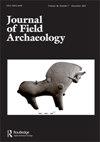马达加斯加北部神秘的软石容器:中世纪采石场的岩石学研究
IF 1.5
1区 历史学
0 ARCHAEOLOGY
引用次数: 2
摘要
从公元8世纪到15世纪晚期,所谓的拉斯卡伊(Rasikajy)人口居住在马达加斯加北部,用软石制成的车床式三脚架容器的生产是其主要特征之一。这些容器的原材料是在内陆采石的,最近对30多个采石场进行了访问、记录和采样。Bobalila的采石场是有史以来第一个被挖掘出来的采石场,并采集了大量的样品进行岩石学分析。结果揭示了显著的矿物学和化学差异,几乎与马达加斯加北部所有其他采石场之间的差异一样大。潜在的过程可能会影响其他软石,并且应该在来源尝试中考虑。尽管如此,岩石学研究使我们能够了解和描述Rasikajy工人所追求的材料类型,现在可以很容易地将其与印度洋贸易网络中的其他软岩船区分开来。本文章由计算机程序翻译,如有差异,请以英文原文为准。
The Enigmatic Softstone Vessels of Northern Madagascar: Petrological Investigations of a Medieval Quarry
ABSTRACT The production of lathe-turned tripod vessels made from softstone is one of the major features of the so-called Rasikajy population that inhabited northern Madagascar from the ca. 8th to the late 15th century a.d. The raw material for the vessels was quarried in the hinterland, and over 30 quarries have recently been visited, documented and sampled. The quarry of Bobalila is the first to ever be excavated, and a large sample suite was taken for petrological analysis. The results reveal significant mineralogical and chemical variation that is almost as large as the variation between all other quarries in northern Madagascar. The underlying processes could affect other softstones and should be considered in provenance attempts. Nonetheless, the petrographic study has permitted us to understand and characterize the type of material that was sought-after by Rasikajy workers, which can now be easily distinguished from other softstone vessels in the Indian Ocean trade network.
求助全文
通过发布文献求助,成功后即可免费获取论文全文。
去求助
来源期刊

JOURNAL OF FIELD ARCHAEOLOGY
ARCHAEOLOGY-
CiteScore
4.60
自引率
5.30%
发文量
29
期刊介绍:
The Journal of Field Archaeology is an international, refereed journal serving the interests of archaeologists, anthropologists, historians, scientists, and others concerned with the recovery and interpretation of archaeological data. Its scope is worldwide and is not confined to any particular time period. Contributions in English are welcomed from all countries.
 求助内容:
求助内容: 应助结果提醒方式:
应助结果提醒方式:


